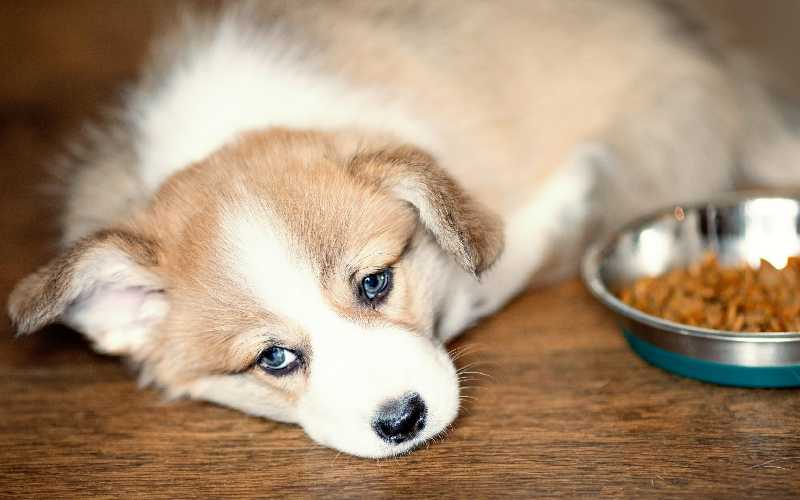patterdaleterriers.co.uk is a participant in the Amazon Services LLC Associates Program and other affiliate advertising programs designed to provide a means for us to earn fees by linking to Amazon.co.uk and affiliated sites. Affiliate links may be used on this page and in patterdaleterriers.co.uk articles, but they do not impact on the price that you pay and they do help me to get this information to you for free. Read my privacy policy for more information regarding affiliates.
As a general rule, weaned puppies under six months should be fed three times a day; after six months, the meals are reduced to twice a day; once in the morning and again in the evening. When they reach maturity, some people continue to retain twice a day feeding. Others reduce to a once a day feeding regime.
There are a few reasons why a puppy stops eating or won’t eat, so let’s go through some of them here:
New Puppy
If you’ve just brought a new puppy home and they’re not eating, it’s probably just that they need time to settle in. A pup who has been separated from their littermates and possibly their mother for the first time is going to be anxious and confused. Give them a little time to settle in. Chances are, when they are really hungry, they will eat.
Change of Food
When you collect your puppy from the breeder or rescue centre, check the food they have been eating. Frequently, good breeders will give you a couple of days worth of the exact food to get you started or sell you your starter supply.
Full Up
If your puppy has been with you a day or so and was eating fine and has now stopped. Check them over for any signs of ill health. The chances are you’ve been feeding them well, and they are not hungry. Check their faeces are normal and the frequency of urination and defecation has not declined. Try feeding again after a couple of hours. If you suspect your puppy is unwell, call your vet.
If your puppy has been with you for a while and suddenly stops eating, there may be something wrong. Check the frequency of urination and defecation has not declined and that their faeces looks normal. If you are worried, call your vet and explain any differences in urination and defecation.
Change of Diet
Have you changed your puppy’s diet? Sometimes, if you change the diet, suddenly your puppy will initially be excited to try the new food and then decide they don’t like the change or that the change was sudden. A sudden change can impact on their gut flora and cause discomfort.
Regular Meals
Are you feeding your puppy regularly? Sometimes someone else in the household may have fed them, so they are too full-up to eat when you give them their regular meal. It may be that someone else has been training the puppy with snacks, and the pup is just not hungry.
Change of Soft Food to Kibble
You should always adust changes in the diet gradually for any dog. Something that is particularly important for puppies and especially so when changing from a wet food diet to a dry food diet. If you want to feed a dry food diet and you’ve gradually changed over, and now your pup’s not interested. Wetting the kibble for a few days and gradually reducing it to soaking half the kibble, and keeping the rest dry is a way to get them on the way to a dry food diet.
Lack of Interest
Another reason may be that there is something more interesting going on elsewhere. Puppies that develop into fussy eaters may need somewhere quiet to eat their meals.
A couple of tips:
When training your puppy with food, reduce the amount used when training from their next meal.
Don’t be too alarmed or fuss too much over a puppy that’s not eating. Doing so could spiral into fussy eating because of all that lovely attention.
Note:
Puppies health can decline suddenly and quickly. ALWAYS call your vet if you are worried that your puppy has stopped eating.

